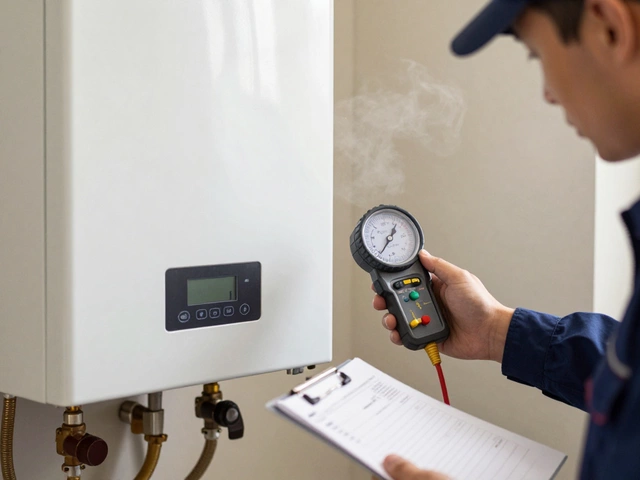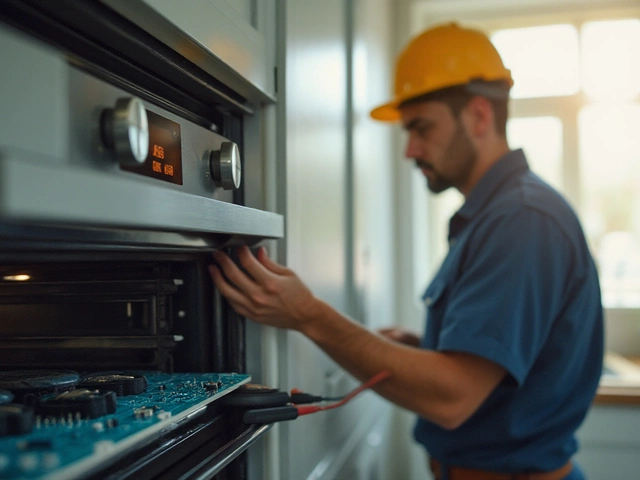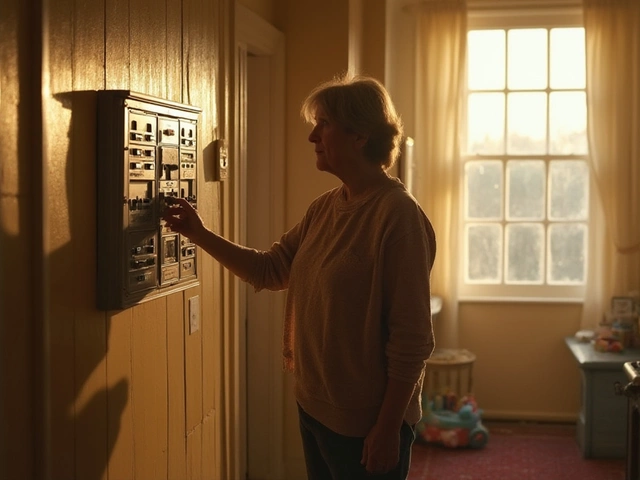So you're looking into what the heck 'appliance for a job' really means when it comes to the appliance service world. It's not just about fixing dishwashers or installing dryers; it’s a whole blend of skills and know-how that you'll need to shine in the role. It’s kinda like being a detective, but for machines.
First things first, let’s chat about skills. Sure, you might think a lot of it is technical, like understanding the ins and outs of a busted fridge. That's true, but there’s so much more. Think communication. Yep, talking to customers and figuring out their needs is a biggie. And then there’s problem-solving—every day can throw a curveball, and you have to be ready to knock it outta the park.
- Defining Appliance in Job Terms
- Skills Every Technician Needs
- The Role of Experience
- Training and Certifications
- Matching Your Skills to Job Needs
- Tips for Landing the Job
Defining Appliance in Job Terms
When you hear the term appliance for a job, what pops into your mind? It’s not just the gadgets around your kitchen. In the job world, especially in the appliance service industry, we’re talking about the perfect mix of skills and knowledge needed to keep those gadgets running smoothly.
Think of 'appliance' in this context as a set of tools you bring to a job—not the physical tools like screwdrivers, but the skills and savvy you've picked up over time. Whether it's understanding the inner wiring of a washer or knowing the quickest fix for a cranky oven, it's all about the expertise you apply to solve issues.
A recent survey showed that employers rank 'problem-solving skills' as a top priority for any appliance technician. This is no surprise, as appliance services aren’t just routine fixes. You'll often deal with unexpected problems that demand quick thinking. According to Craig Nelson, a well-regarded technician with over 20 years of experience, "An appliance technician is like a doctor for machines. You need to diagnose the symptoms and provide a cure that lasts."
But don't just take it from us. Companies are on the lookout for folks who show a blend of these qualities. So, how do you stack up? Here are a few skills that make up a killer set of job appliances in this industry:
- Technical Skills: This is your bread and butter. Know your way around the machines, from troubleshooting to repairs.
- Customer Interaction: Half the job is dealing with people. Make sure you can explain issues and solutions in a clear, simple way.
- Adaptability: The appliances you'll work on are always evolving. Staying updated with the latest tech and trends keeps you ahead of the game.
Master these, and you’ll be well on your way to becoming the go-to guy for any appliance hiccups in town. It’s about striking the right balance between technical know-how and soft skills, and that, my friend, is the real definition of appliance in job terms.
Skills Every Technician Needs
Alright, let’s break down the key skills every appliance technician should keep in their toolbelt. We’re talking about a mix of hands-on abilities and people skills that can make or break your career in appliance service.
First off, a solid technical understanding is non-negotiable. This means getting comfy with the various parts of appliances and figuring out the 'why' behind the infamous clunks and clinks. Ever heard a washing machine sound like it's trying to eat a rock? Yea, you need to know what's going on there.
Another big one is diagnostic skills. This is where you channel your inner detective. You’ll need a good eye and a sharper mind to identify issues fast and accurately. Customers appreciate technicians who can figure things out without making endless trips.
Now, let’s talk about communication. You might be a wizard with a wrench, but you have to explain things in English, not just in tech-speak. Whether it's discussing what you’ve fixed or talking repair options, clear communication creates a better experience for the customer.
Then there’s time management. One of your tools should be a good watch (well, or a smartphone). You gotta juggle different jobs and customers effectively. No one likes waiting, especially not when their fridge is on the fritz. So, being punctual and efficient is crucial.
Lastly, let's touch on safety awareness. Working with appliances often means dealing with electricity and moving parts, and nobody wants a shocking surprise. So, stick to those safety protocols and ensure you and your customers are always in safe hands.
- Technical Understanding
- Diagnostic Skills
- Communication
- Time Management
- Safety Awareness
The Role of Experience
When it comes to the appliance service industry, experience can be your best friend. It's not just about having the skills written down on your resume, but about proving you can handle real-world challenges. Ever heard of the saying, “Experience is the teacher of all things”? Well, it fits perfectly here.
Think about troubleshooting a washing machine that randomly stops mid-cycle. Textbook knowledge might give you a starting point, but actual hands-on experience—maybe from dealing with a hundred similar cases—will guide you to the right fix faster. This kind of experience builds confidence and efficiency, making you invaluable on the job.
Employers love seeing a solid resume, of course, but they’ll often want to know: have you dealt with this kind of issue before? Hands-on experience means you’ve probably encountered all kinds of weird problems and figured out how to solve them, maybe when nobody else could. That’s something you can brag about, believe it or not.
- Real-world troubleshooting skills.
- Enhanced ability to communicate effectively with customers.
- Faster and efficient problem-solving.
In some cases, it might even be worth logging some volunteer hours or internships if you’re just starting out. Bottom line: time spent working on actual appliance issues counts more than you might think. Remember, every breakdown is a chance to learn something new—embrace it!

Training and Certifications
Thinking about diving into the world of appliance service? Let’s talk about training and certifications because, trust me, these matter a lot. Whether you're starting fresh or trying to level up, having proper training and those handy-dandy certifications can put you miles ahead in the game. Plus, they show employers you're serious about knowing your stuff.
First off, let’s look at some must-have certifications. The EPA Section 608 certification is pretty essential if you're gonna handle anything with refrigerants, which is super common in appliances like fridges and air conditioners. It doesn't just make you legal; it shows you know how to handle these materials responsibly. No one wants a refrigerant leak disaster on their hands!
Next, consider getting NATE (North American Technician Excellence) certification. This one's like a gold star on your resume in the service industry and shows you've got top-notch skills. If you want to stand out, check into manufacturer-specific certifications, too. Brands often have their own training programs, so when you walk into a job interview and say you're certified in XYZ brand's appliances, it's like dropping a mic.
Now, don’t panic about spending a zillion bucks on training. There are affordable ways to up your game. Community colleges and technical schools offer courses on appliance service that won’t drain your wallet. And hey, online courses are a big deal now. Not only can you learn at your own pace, but some places offer interactive stuff that makes it more fun than snooze-inducing lectures.
Let’s not forget about hands-on training. Many programs offer apprenticeships or work placements, and that's where you’ll get the real-deal experience. Think of it as a chance to play detective with a safety net. Plus, it’s a sweet way to network—maybe even score a job offer when you're done.
Here’s a quick breakdown of potential paths to look into:
- Community College Programs – Affordable and comprehensive
- Online Certification Courses – Flexible and diverse options available
- Apprenticeships – Hands-on experience with industry mentors
- Manufacturer-specific Training – Specialized knowledge with specific brands
Having the right training and certifications in your back pocket means you're not just another name on a job application. It marks you as a skilled pro in the appliance technician world, ready to tackle whatever tech issues come your way. So, gear up and get certified!
Matching Your Skills to Job Needs
Ever wonder how to make sure your skills don't just float around aimlessly but actually land you that gig in the appliance service world? It's all about lining up what you know with what the job needs. Let's break it down.
First off, you’ll want to dive deep into the job description. Seriously, it’s your cheat sheet! Take note of the specific skills they’re looking for. If they want someone savvy with HVAC systems, then you better have those skills highlighted in your resume. Companies aren't looking for a jack-of-all-trades but someone who really knows their stuff in the particular area they need.
It's not all about technical skills. Remember we talked about communication earlier? The appliance service industry is all about bridging the gap between tech talk and customer chatter. When you're writing your job application or during the interview, share stories of when you’ve solved a tricky problem and left the customer smiling.
There’s also the matter of experience. Align your past jobs and tasks with what’s required. Even if you haven’t dealt directly with every appliance, similar experiences count. Have you managed a team of technicians before? Boost that up—it shows leadership and management capability, both of which are huge pluses!
Lastly, highlight any training and certifications. If you've done extra courses, like learning cutting-edge appliance technologies or energy-efficient systems, wear those as a badge of honor. Employers love knowing they're hiring someone who stays ahead of the curve.
Don’t forget, sometimes employers include 'preferred' qualifications. If you don't meet every single one, don't panic. Show off the strongest skills you have that match what they need.
In this game, having a clear, well-tailored application can make all the difference. It's like being the perfect missing puzzle piece they didn't know they needed. So, when considering your next move, think: am I showing them the right skills for their job?
Tips for Landing the Job
Okay, so you're all set to step into the world of appliance service, but how exactly do you land that gig? It’s all about making the right moves.
First off, you've gotta highlight your strengths in your resume. Employers in the service industry are looking for both technical prowess and customer skills. So, if you’ve dealt with cranky customers or fixed a funky fridge, flaunt it. Don't just speak about what you’ve learned, but show how you've applied it.
Next, dive into the world of certifications. Having some official training can really set you apart. Organizations like the International Association of Certified Home Inspectors offer courses that can beef up your credentials.
Networking can’t be underestimated. Join forums or local groups where technicians and companies meet. It’s not just about who you know but being known as someone who's engaged and eager. Sometimes, a job lead is just a handshake away.
Oh, and don’t overlook the power of social media. Platforms like LinkedIn aren’t just for office folk. Post about your work, share insights, and connect with industry leaders. Your online persona can be just as important as that polished resume.
Finally, research the companies you’re applying to, especially if you’ve got an interview lined up. Knowing their operations, what kind of appliance technicians they need, and even their company culture can give you a leg up.
If you follow these steps, you're not just applying to jobs; you're creating opportunities. And in the fast-paced world of fixing stuff, that's what'll get you hired.





